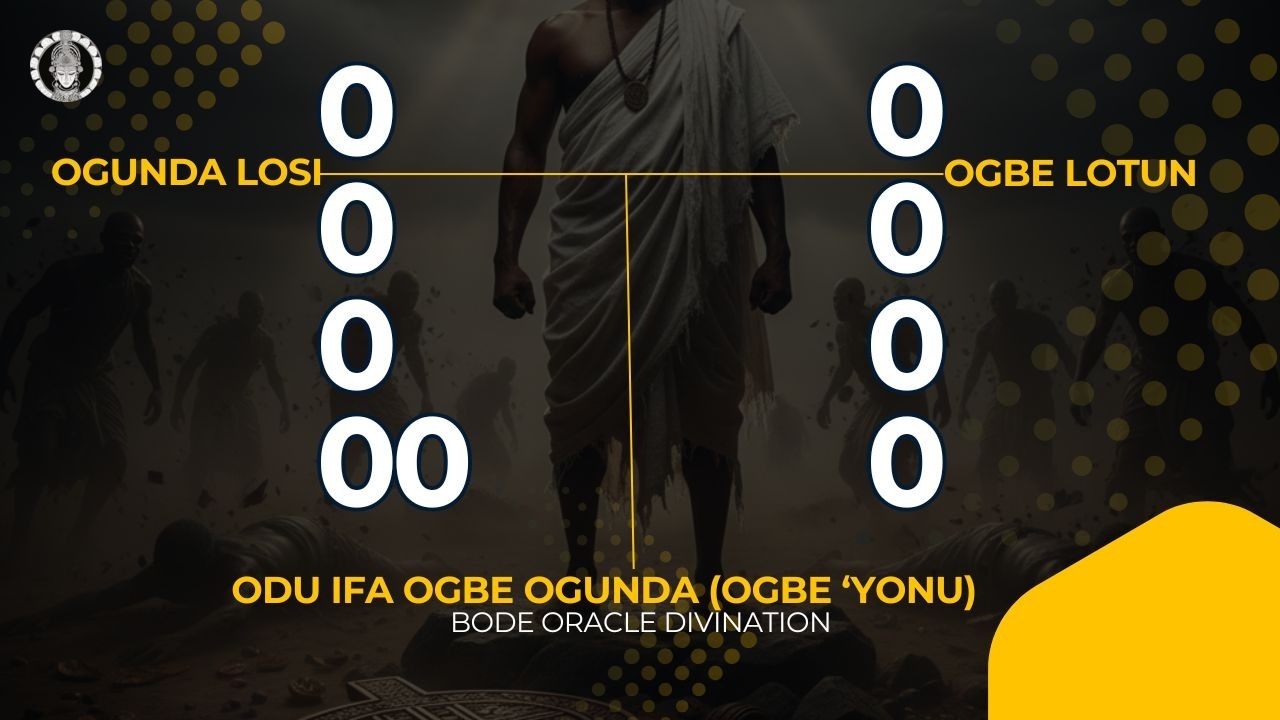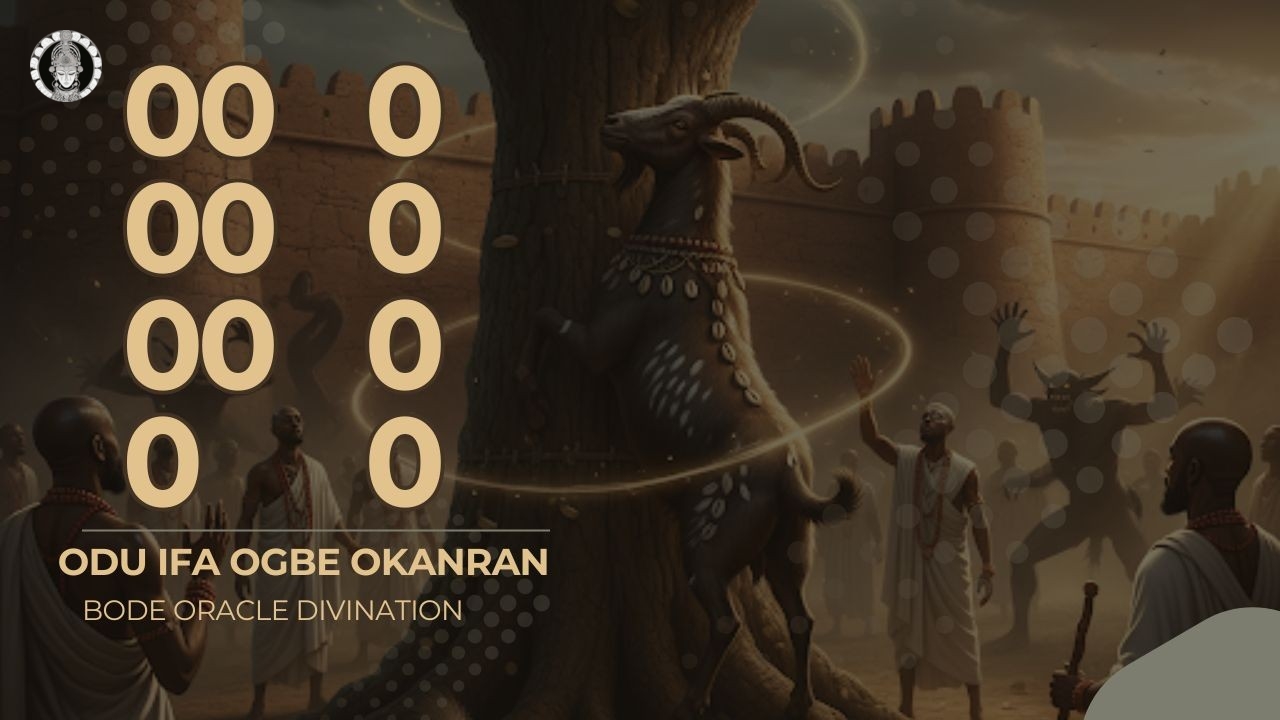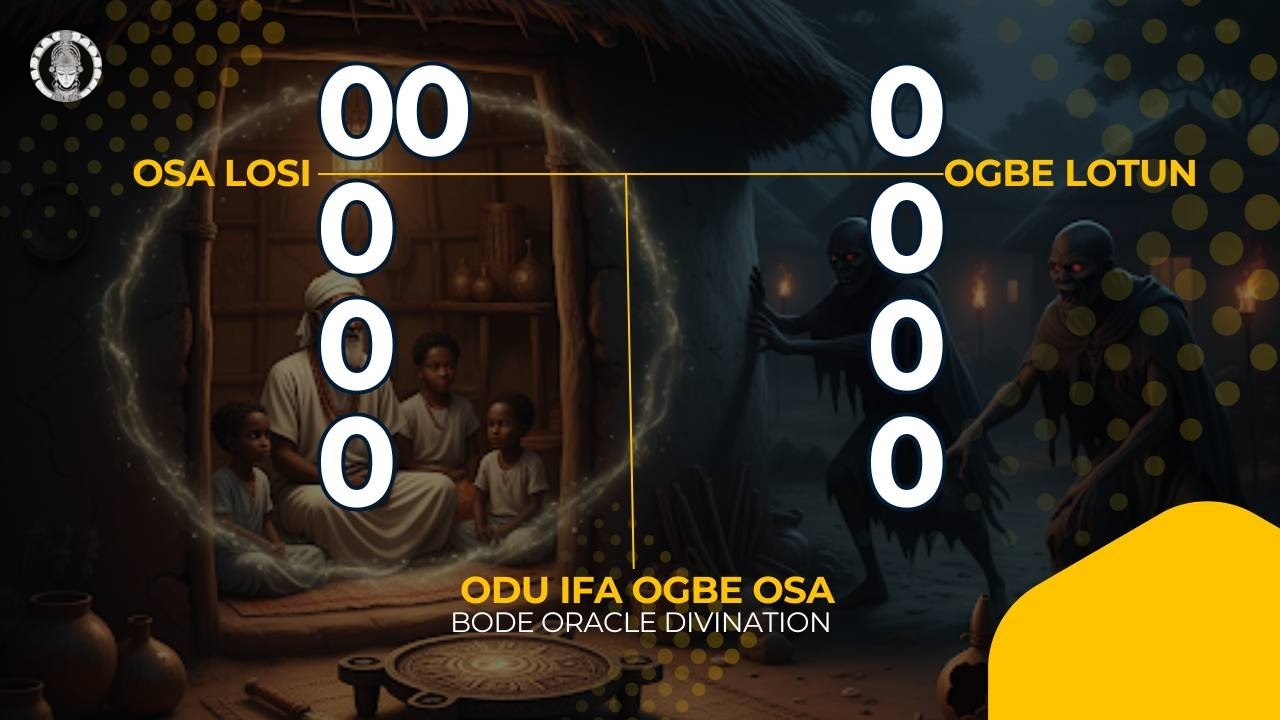Introduction to Odu Ifa Ogbe Osa (Ogbe Sa)
Odu Ifa Ogbe Osa, also known as Ogbe Sa, represents one of the 256 sacred divination signs in the Ifa corpus. This powerful Odu carries profound messages about spiritual protection from enemies and malevolent forces, prosperity achieved through serving others, the attraction of followers and leadership authority, and destiny fulfillment through strategic relocation. The name "Ogbe Sa" itself means "Ogbe ran away" or "Ogbe escaped," emphasizing this Odu's primary theme of evasion from harm and the redirection of negative forces.
The divinations within Ogbe Osa address critical human concerns: protection from spiritual attacks sent by enemies, the accumulation of wealth through spiritual service rather than exploitation, the natural attraction of followers through proper spiritual preparation, and the wisdom to recognize when one's destiny requires geographic change. Each story serves as both spiritual instruction and practical guidance, teaching us that proper sacrifice creates impenetrable barriers against malevolence while simultaneously opening pathways to prosperity, influence, and fulfillment. For comprehensive understanding of the 16 Odu Ifa and their meanings, explore our detailed guide.
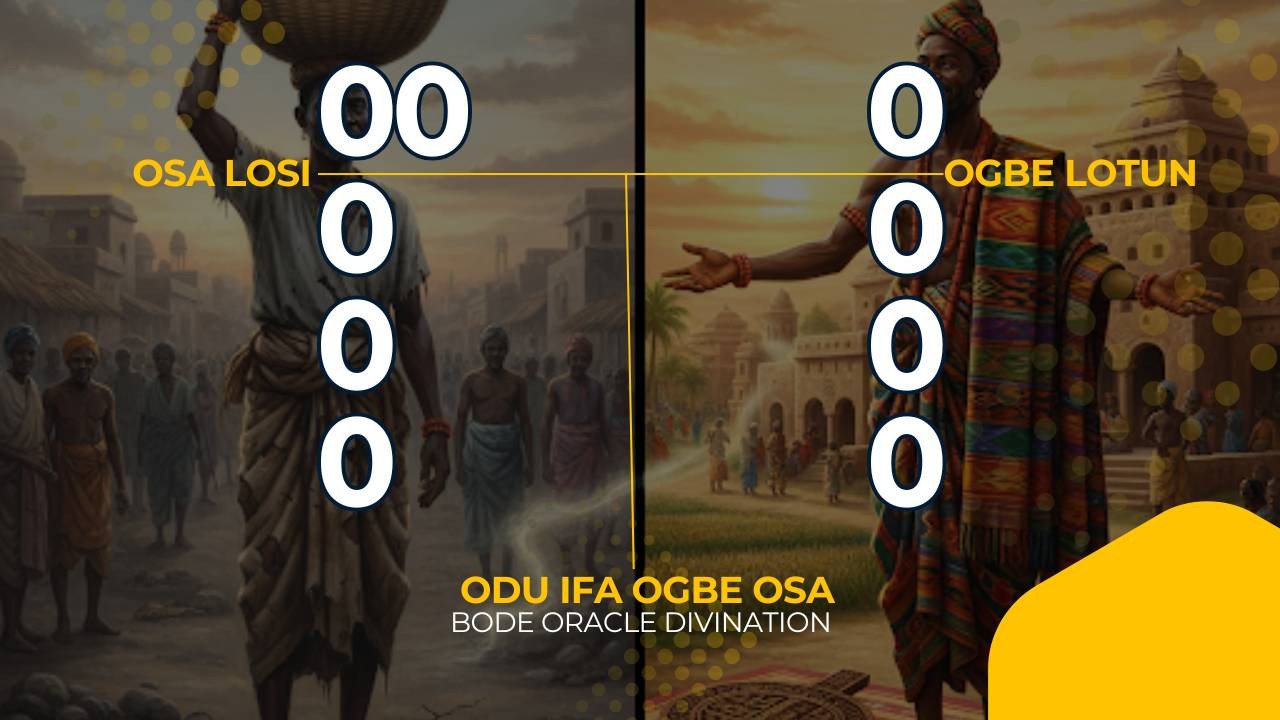
Ifa Divination for Orunmila: Protection from Spirits of Misfortune
Understanding Spiritual Warfare and Divine Protection
This divination from Ogbe Osa addresses one of the most serious spiritual challenges—deliberate attacks from enemies who send malevolent forces (ajogun ibi) against a person. Orunmila, the embodiment of Ifa wisdom itself, faced enemies who plotted against him. Rather than relying solely on his own spiritual power, Orunmila demonstrated the proper protocol: bowing his head (humility), calling upon the Awo (spiritual consultants), and performing prescribed sacrifices.
What makes this divination particularly instructive is that it involves Orunmila himself, suggesting that even the most spiritually powerful individuals face opposition and must follow proper spiritual procedures for protection. This teaches that spiritual authority does not exempt one from the need for sacrifice and consultation—in fact, those with great spiritual responsibilities often face greater spiritual opposition.
The Strategic Relocation of Loved Ones
A crucial detail in this divination is that Orunmila sent his child to the forest (gbọmọ rè sá gàjà) to escape death. This demonstrates a practical dimension of spiritual protection: sometimes physical separation or relocation of vulnerable family members is necessary while spiritual work is being performed. The forest represents a spiritually neutral space where the child would be beyond the reach of enemies who knew the family's usual location.
This principle applies in modern contexts when families face intense spiritual opposition. Temporary relocation of children or vulnerable family members to neutral locations while spiritual remedies are performed can provide an additional layer of protection. This is not cowardice but strategic wisdom—protecting the vulnerable while addressing threats at their spiritual root.
The Sacred Verse
Ọwó ri iyan, ọwó y'óké
Àtàǹpàkò ló rí àgbàdo òjò ló ṣe mùlúnkú mùlúnkú
A d'Ífá fún Òrúnmìlà
Yí óò gboọmọ rè sá gàjà nitori ikú.
English Translation
The hand sees pounded yam, the hand lifts it upward
It is the thumb that sees same day harvested corn, that was joyful
This was the Ifa cast for Orunmila
When he send his child to the forest to escape death.
The Symbolism of Hand and Thumb
The opening verse contains profound symbolism. The hand seeing pounded yam and lifting it upward represents the natural, immediate response to opportunity—when food is before you, you consume it. The thumb's joy at seeing fresh corn (àgbàdo òjò—corn harvested the same day it rained) represents appreciation for timely blessings. Together, these images teach that just as the hand responds immediately to nourishment, so must one respond immediately to spiritual warnings and prescribed protections.
The thumb specifically is significant because it makes the hand functional—without the thumb, the hand cannot grasp effectively. This represents Orunmila's child—the continuation of his lineage and spiritual work. Protecting the "thumb" (the child) ensures the "hand" (the family, the spiritual lineage) can continue functioning.
The Reversal of Malevolent Forces
The most powerful aspect of this divination is the complete reversal of spiritual attack. When enemies sent ajogun ibi (spirits of misfortune) against Orunmila, these forces could not reach him, his child, or his wife. Instead, they returned to those who sent them. This demonstrates a fundamental principle in Yoruba spirituality: properly performed sacrifices don't just create passive barriers but actively redirect negative energy back to its source.
The verse states this explicitly: "Death entered my house but did not touch me. The gourd of the spirit of emptiness died midway." The gourd (kèrégbè) represents the spiritual container carrying misfortune. When it "dies midway," it means the attack loses all power before reaching its intended target. This isn't mere deflection—the attack is completely neutralized, and its energy returns to harm those who initiated it.
The Comprehensive List of Defeated Forces
Orunmila's declaration itemizes the defeated forces: death (ikú), illness (àrún), and all spirits of misfortune (gbogbo ajogun ibi). This comprehensive listing teaches that the protection offered by this Odu extends to all categories of spiritual attack. Whether enemies send death, disease, financial ruin, relationship destruction, or any other misfortune, the spiritual barrier created by proper sacrifice prevents all of them from manifesting.
The repetitive structure—"entered my house but did not touch me, the gourd died midway"—emphasizes the completeness and reliability of this protection. It's not uncertain or partial; it's absolute and comprehensive when the prescribed sacrifices are properly performed.
Prescribed Offerings (Ebo)
While the specific offerings are not detailed in this particular verse, the divination emphasizes that Orunmila performed exactly what was prescribed (ó rú'bọ). The effectiveness of the protection came not from improvisation but from precise obedience to the Awo's instructions. For those receiving this Odu, consultation with a qualified Babalawo is essential to determine the specific offerings needed for their particular situation, as the nature of the threats and the person's spiritual state will influence what is required. For scholarly perspectives on Ifa as a knowledge system, refer to comprehensive resources on African Traditional Religions and Ifa Divination.
Modern Application and Spiritual Warfare
In contemporary society, spiritual attacks may manifest through various means: inexplicable obstacles in multiple areas of life simultaneously, sudden health crises without medical explanation, financial catastrophes despite sound planning, or relationship breakdowns that seem orchestrated by unseen forces. When multiple negative events cluster together without logical connection, Ogbe Osa suggests investigating possible spiritual opposition.
However, this Odu also warns against paranoia. Orunmila didn't assume spiritual attack until he became "suspicious" (fura si)—meaning he observed patterns that suggested coordinated opposition. Not every difficulty represents spiritual warfare; some challenges are natural life processes requiring different responses. Proper divination helps distinguish between ordinary challenges and targeted spiritual attacks requiring this specific form of protection.
Ifa Divination for Orunmila: Prosperity Through Spiritual Service
The Hesitation Before Divine Assignment
This divination from Ogbe Osa reveals a profoundly human moment: Orunmila's hesitation before undertaking spiritual work. He planned to travel to the countryside (ìgbèriko) to perform divination but found himself uncertain whether to go or stay. This hesitation is significant—it demonstrates that even the most spiritually developed individuals experience doubt before major undertakings.
The internal dialogue (ominú wá ńkọ ó) Orunmila experienced teaches an important principle: doubt is not weakness; acting without proper spiritual consultation is. Rather than forcing himself forward through uncertainty or abandoning the journey due to fear, Orunmila sought divine guidance. This demonstrates the proper response to hesitation: consultation, sacrifice, and then action.
The Sacred Verse
Ìbájé owó kò láṣànú
A d'Ífá fún Òrúnmìlà
L'ọjọ ti ó n roko réé lá.
English Translation
A damaged money does not get thrown away
This was the Ifa cast for Orunmila
On the day he was going to farm to become wealthy.
The Profound Wisdom of Damaged Money
The opening verse "Ìbájé owó kò láṣànú" (damaged money does not get thrown away) contains multiple layers of meaning. Literally, it refers to the Yoruba practice of accepting even torn or damaged currency because its value remains despite its condition. This teaches several principles simultaneously.
First, it suggests that opportunities that appear imperfect, difficult, or unpromising should not be immediately rejected. Just as damaged money retains value, apparently flawed opportunities may yield significant returns. Second, it implies that people who appear broken, disadvantaged, or marginalized possess inherent worth and potential. Third, applied to spiritual work specifically, it means that every opportunity to serve—no matter how small, remote, or seemingly insignificant—can generate prosperity when approached with proper spiritual preparation.
The metaphor also addresses Orunmila's hesitation. The countryside (ìgbèriko) might have seemed like "damaged" territory compared to more prestigious urban locations. Traveling to serve rural communities might have appeared less valuable than remaining in established centers of power. Yet Ifa revealed that this apparently less promising journey would yield great wealth.
Spiritual Work as Agricultural Labor
The phrase "roko réé lá" (going to farm to become wealthy) creates a powerful metaphor. While Orunmila was literally performing divination services, Ifa characterizes this as farming. This comparison teaches several important lessons about spiritual work and prosperity.
Farming requires preparation of soil, planting of seeds, patient cultivation, and eventual harvest. Similarly, spiritual service involves preparing people's lives through divination, planting solutions through prescribed sacrifices, patiently supporting them through implementation, and eventually harvesting gratitude and material appreciation. The metaphor emphasizes that prosperity through spiritual work is not exploitation but cultivation—you help others grow, and in their growth, your own prosperity naturally emerges.
Furthermore, farming is location-dependent. Not all soil yields the same harvest; farmers must sometimes travel to find fertile land. This reinforces the divination's message that Orunmila needed to travel to the countryside specifically to find the "fertile ground" (people in need of spiritual help) where his work would yield the greatest return.
The Cycle of Service and Blessing
The divination describes a beautiful cycle: Orunmila arrived, found people struggling (ení tí kò rí ṣe), performed divination for them, they began to prosper (onikálukú bèrè sí rí ṣe), and in gratitude they gathered gifts and tribute for him (wọn ṣe ńkó ẹrú Kó ẹni fún Òrúnmìlà). This sequence reveals the authentic path to spiritual prosperity.
Notice that Orunmila didn't demand payment before service or set fixed fees. He simply helped those in need. Their prosperity came first, and their gratitude generated his wealth. This demonstrates a fundamental spiritual principle: when you genuinely serve others' needs, your own needs are met through the natural flow of reciprocity and appreciation.
The phrase "kó ẹrú Kó ẹni" (they gathered tribute) suggests abundance—not minimal payment but generous honor. When spiritual service authentically transforms lives, gratitude expresses itself abundantly. This distinguishes true spiritual work (which generates grateful abundance) from spiritual exploitation (which extracts minimal payment through fear or manipulation).
The Triple Declaration of Victory
Orunmila's concluding statement contains three powerful assertions: "Ogbè sá òòò" (Ogbe ran away/escaped), "Ogbe là" (Ogbe overcame/prospered), and "Ogbè ló roko rèé lá" (Ogbe safely returned from the farm wealthy). These three statements capture the complete journey: escape from danger (protection), overcoming obstacles (victory), and return with wealth (prosperity). This triple declaration emphasizes that spiritual success involves all three dimensions—protection, triumph, and material blessing.
Prescribed Offerings (Ebo)
The divination prescribed sacrifice before Orunmila's journey to ensure both safe return and prosperity. This teaches an important principle: sacrifices for travel should address both protection and success. Modern practitioners traveling for business, spiritual work, or any significant purpose should consult with qualified Babalawos to determine appropriate offerings that create spiritual pathways for both safety and achievement. Explore more wisdom from our collection of Ifa teachings.
Modern Application: Service-Based Prosperity
In contemporary contexts, this divination speaks to all who provide services—whether spiritual counseling, professional expertise, creative work, or any form of assistance to others. The principle remains constant: genuine prosperity flows from authentic service that improves others' circumstances. When your work genuinely helps people prosper, they will honor you abundantly.
This contrasts sharply with extractive models that prioritize profit over service. Ogbe Osa teaches that sustainable, blessed prosperity comes through a service-first approach. Focus on effectively addressing others' needs, and material reward will naturally follow through gratitude and referrals. This is not naive idealism but practical spiritual economics—people generously support those who genuinely help them succeed.
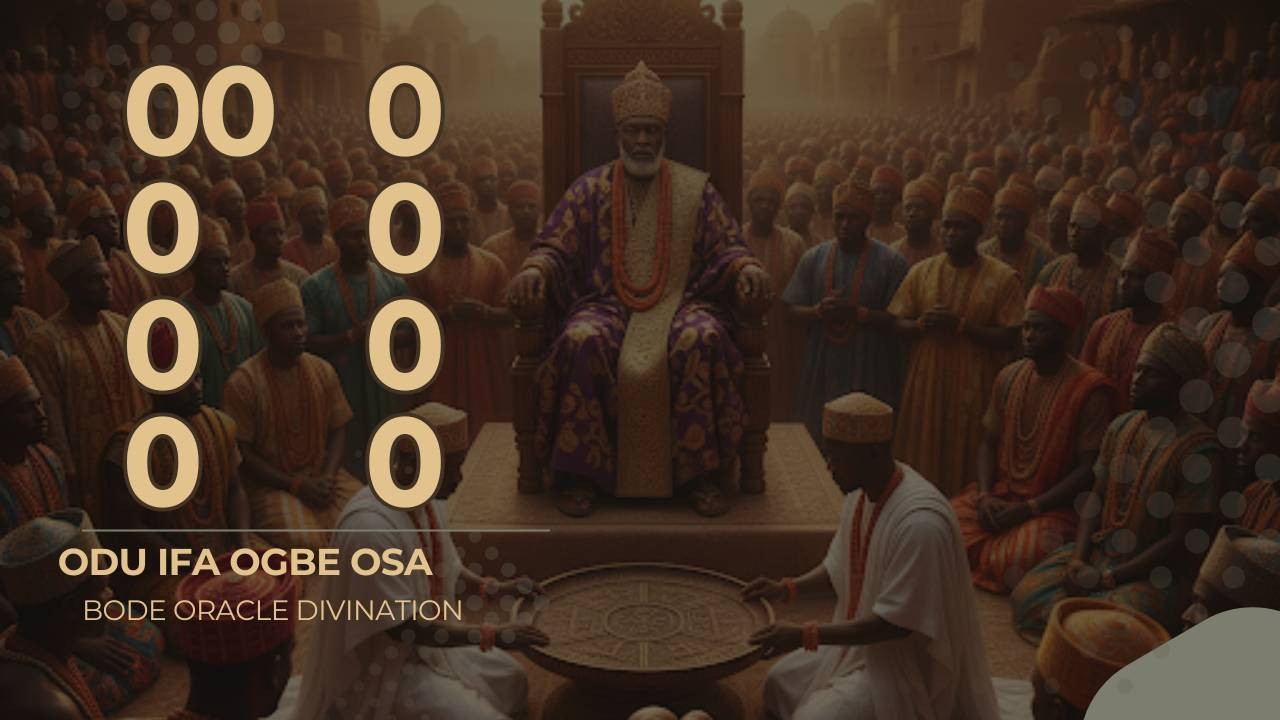
Ifa Divination for the King of Oyo: Gaining Followers and Leadership
The Crisis of Legitimacy Without Followers
This divination from Ogbe Osa addresses a profound leadership crisis: a king without followers. The King of Oyo possessed the title, the throne, and presumably the regalia of authority, yet he had no olusin (followers or servants). This represents one of the most painful leadership experiences—holding position without genuine influence, possessing title without actual authority, having the crown without the kingdom.
This situation reveals an important truth about authentic leadership: it cannot be self-declared or maintained through force alone. True leadership requires voluntary followership, which comes through spiritual alignment rather than coercion. The King's willingness to seek spiritual investigation (kí wọn ó bá òun ṣe iwádìí) demonstrates wisdom—rather than blaming others or attempting to force allegiance, he recognized that the problem required spiritual intervention.
The Sacred Verse
Gbómú-gbómú Ṣígídí
Ṣígìdì gbómú-gbómú
A d'Ífá fún ọba l'Óyòó
ọmọ amúgba igbin pèrò loye
gbómú-gbòmú-gbómú
English Translation
Gbomu-Gbomu Sigidi
Sigidi Gbomu-Gbomu
This was the Ifa cast for the king of Oyo,
The one who carries snails to offer calmness
Gbomu-Gbomu-Gbomu.
The Mystery of "Gbomu-Gbomu Sigidi"
The repetitive phrase "Gbómú-gbómú Ṣígídí" carries rhythmic, almost hypnotic power. While "Sigidi" often refers to a carved figure used in spiritual work, the phrase "gbomu-gbomu" suggests carrying, supporting, or holding up. The repetition creates a sense of steady, persistent accumulation—like the slow, continuous movement of gathering followers.
This rhythmic incantation teaches that gaining followers is not a sudden event but a gradual process. Each repetition of "gbomu-gbomu" represents another person drawn to the leader's influence, another relationship built, another connection established. The hypnotic quality suggests that true followership operates almost unconsciously—people find themselves naturally drawn to properly prepared leaders without fully understanding why.
The Symbolism of Two Hundred Snails
The prescription of two hundred snails (igba ìgbín) for offering to Odu carries profound symbolism. Snails represent several qualities essential for attracting followers: patience (they move slowly but persistently), peace (they are non-threatening creatures), consistency (they leave lasting trails showing their path), and carrying one's home (self-sufficiency and stability).
The number two hundred (igba) represents completeness and abundance in Yoruba numerology. It's not merely many but the full measure necessary for comprehensive transformation. Offering this many snails demonstrates serious commitment and significant investment—gaining authentic followers requires substantial spiritual preparation, not minimal effort.
The phrase "amúgba igbin pèrò loye" (the one who carries snails to offer calmness) reveals the spiritual mechanism. The snails bring "pèrò" (calmness, peace, coolness) to the king's leadership. This teaches that people follow leaders who bring peace rather than turmoil, calmness rather than chaos, stability rather than drama. The snails spiritually align the king's authority with these attractive qualities.
The Cascading Effect of Spiritual Leadership
The divination describes a beautiful cascade: first Alara sent followers, then Ajero, then Owarangun. These were themselves powerful kings, yet they sent their people to serve the King of Oyo. This demonstrates that properly prepared spiritual authority attracts support even from other powerful figures. When one's leadership is spiritually aligned, even peers and rivals find themselves drawn to offer allegiance.
Notice the progression: the sacrifice was performed, and "it didn't take long" (Kò ì pé) before followers began arriving. This teaches that authentic spiritual preparation produces relatively quick visible results. While the sacrifice itself (gathering two hundred snails) required effort, once properly offered, the manifestation came rapidly. This distinguishes genuine spiritual work from endless, ineffective rituals that never produce tangible outcomes.
Prescribed Offerings (Ebo)
For those seeking followers, influence, or leadership authority, Ogbe Osa prescribes offering snails to Odu. The specific number and additional offerings should be determined by a qualified Babalawo based on individual circumstances. The offering creates spiritual conditions that make one's leadership naturally attractive, drawing followers through spiritual magnetism rather than manipulation or force. For scholarly perspectives on Ifa as a knowledge system, refer to UNESCO documentation on Ifa of the Yoruba People.
Modern Leadership and Followership
In contemporary contexts, this divination speaks to all forms of leadership: business management, community organizing, political leadership, spiritual guidance, or social influence. The principles remain constant: authentic followership cannot be forced but must be attracted through spiritual preparation and the qualities that naturally draw allegiance.
Modern applications include gaining team members for projects, building social media followings, attracting clients or customers, recruiting volunteers for causes, or establishing authority in professional fields. In each case, the spiritual principle is the same: focus first on spiritual alignment (the snail offering), cultivate attractive qualities (peace, calmness, consistency), and followers will naturally accumulate.
Ifa Divination for Oridara: Destiny Fulfillment Through Relocation
The Crisis of Stagnation and Location
This divination from Ogbe Osa addresses a painful reality: persistent struggle despite effort, poverty despite hard work, and the sense that one's location itself may be blocking destiny. Oridara (whose name means "goodness has come" or "it has become good") was experiencing the opposite of his name—he was extremely poor (táláká), struggling without success (kò ri ṣe), his desire for better life was intense (ojú npon gidi gidi), and he was socially disadvantaged as a servant (erú).
What makes this divination particularly poignant is Oridara's internal struggle. He pondered deeply about what to do (ó wá pinu wípé kinni óun lè ṣe) and what path to take (àti wípé ònà wo ni òun lè gbá). This represents the existential crisis many people face: knowing that change is necessary but uncertain about direction. His conclusion—to leave his current location—demonstrates self-awareness. He recognized that his struggle might be location-specific rather than solely personal failure.
The Sacred Verse
Àtíòro Ìbínì
Ògóngó Ìjámó
Àgbìgbò ni Ìwọnràn
Àwọn ni wọn ṣawo ọba 'Léyò kankan
A d'Ífá fún Orídára
Tíí ṣe ẹrú Ọṣòrun àkókò
English Translation
The Allied Hornbill of Ibini
Ostrich Ijamo
The giant who carries weight in Iwonran
These were the ones who performed Ifa for the king one after the other.
This was the Ifa cast for Oridara,
A servant of The First Osorun
The Symbolism of Migratory Birds
The verse begins by invoking birds—the hornbill (Àtíòro) and ostrich (Ògóngó)—creatures known for traveling great distances. This immediately establishes the theme of relocation and migration. These birds don't struggle in unsuitable environments; they move to where conditions support their thriving. The hornbill and ostrich, despite their different sizes and characteristics, share the wisdom of strategic relocation.
The "giant who carries weight in Iwonran" (Àgbìgbò ni Ìwọnràn) adds another dimension. This figure represents the ability to carry heavy burdens across distances—suggesting that relocation doesn't mean abandoning responsibilities but rather moving with one's commitments to more favorable circumstances. Oridara's poverty and servant status were his burdens, but relocation would transform how those burdens affected him.
The Critical Importance of Pre-Relocation Divination
A crucial detail distinguishes this divination: Oridara consulted Ifa before relocating (Ṣùgbón kí òun ó tó lọ, òun ó ṣe iwádìí). This demonstrates profound wisdom. While he recognized the need to leave, he didn't simply run away impulsively. He sought divine guidance about whether relocation was spiritually ordained and what spiritual preparations were necessary.
This teaches an essential principle: not all relocations lead to improvement. Some people flee from one difficult situation only to recreate the same struggles in a new location because they didn't address the spiritual roots of their challenges. Oridara's consultation ensured that his relocation was spiritually supported rather than merely geographically different.
The prescription was clear: perform sacrifice so that "ori rè lè gbe dé ibi tí yí óò tí lá" (his destiny can lead him to the place where he will prosper). This reveals that destiny has geographic specificity—certain blessings are location-bound. The sacrifice didn't create prosperity out of nothing; it activated Oridara's ori (personal destiny) to guide him to where his inherent blessings could manifest.
The Transformation Through Strategic Relocation
The divination states powerfully: "ẹsé rè gbe dé ibi tí yí óò tí lá" (his feet carried him to the place where he would prosper). This phrase emphasizes that the relocation was destiny-guided. His feet didn't wander randomly; they were spiritually directed to the precise location where his destiny could unfold. This is the difference between desperate flight and strategic relocation—one runs from problems, the other moves toward ordained blessings.
The result was dramatic: "Orídára bere sí níí yọ. Inú un rè dùn" (Oridara began to rejoice. His heart was filled with happiness). The transformation wasn't gradual or uncertain—prosperity manifested clearly and quickly once he reached the right location. This teaches that when spiritual preparation aligns with divinely ordained relocation, results come decisively.
The Metaphor of the Gentle Breeze
The verse concludes with beautiful imagery: "Èfufu lele lò ti ńgbe atíòro ré Ibiní" (The gentle breeze carried the Allied Hornbill of Benin). This teaches that divinely guided relocation doesn't require struggle or force. Like a bird riding favorable winds, the properly prepared person finds their journey supported by spiritual forces. The relocation feels natural, almost effortless, because it aligns with destiny rather than fighting against it.
The repetition "Ibi rere tórí ń gbé mi rè, nkó mọ bé" (The good place where destiny carried me, I did not know it) emphasizes that Oridara didn't consciously select his destination through research or planning. His destiny guided him to the right place. This teaches that divinely ordained relocations often lead to unexpected destinations that rational planning might never have identified.
Prescribed Offerings (Ebo)
For those considering relocation or feeling trapped in their current location, Ogbe Osa prescribes sacrifice before moving so that ori (personal destiny) can guide them to where prosperity awaits. The specific offerings should be determined through consultation with a qualified Babalawo, who can assess whether relocation is spiritually appropriate and what preparations are necessary. The sacrifice creates spiritual GPS, ensuring that one's journey leads to blessing rather than merely different struggles. For understanding the artistic and cultural dimensions of Ifa practice, explore UNESCO recognition of Ifa divination system.
Modern Application: When to Relocate
In contemporary contexts, this divination addresses various forms of relocation: changing cities for employment, moving for education, immigration to new countries, or even changing jobs, relationships, or spiritual communities. The principles remain constant: some blessings are location-specific, persistent struggle despite effort may indicate misalignment with one's ordained location, and proper spiritual preparation before relocation is essential.
Signs that relocation may be spiritually appropriate include persistent obstacles despite qualified effort, internal conviction that change is necessary, lack of progress in multiple life areas simultaneously, and dreams or intuitions pointing toward specific locations. However, these signs require confirmation through proper divination, as not all dissatisfaction indicates a need for relocation—some challenges require spiritual intervention in one's current location.
Additional Resources
Internal Links
- Complete Guide to Ogbe Osa - Detailed information, taboos, and practices
- Ogbe Osa Blog Post
- Bode.ng Blog - Extensive collection of Ifa and Yoruba spirituality articles
- Complete Odu Ifa Directory
- All About the 16 Odu Ifa and Their Meaning
External Resources
- African Traditional Religions: Ifa Divination - Duquesne University
- Ifa of the Yoruba People of Nigeria - UNESCO
- UNESCO Recognition of Ifa Divination System
- Ifa Divination System: An Artistic Expression of Yoruba Knowledge Creation
- Ifa Divination System - Wikipedia
- Algebraic Characterization of Ifa Main Divination Codes
Connect With Us on Social Media
- BODE Oracle on TikTok
- BODE Oracle on YouTube
- BODE Oracle on Facebook
- BODE Oracle on X (Twitter)
- BODE Oracle on Pinterest
Visit Bode.ng to explore more divination teachings, participate in quizzes and polls, and connect with our community of practitioners and learners. Register today to access exclusive content and personalized guidance on your spiritual journey.
Frequently Asked Questions And Answers About Odu Ifa Ogbe Osa (Ogbe Sa)
Find answers to common questions about this sacred Odu Ifa and its divination teachings
Ogbe Osa, also called Ogbe Sa, is one of the 256 sacred Odu (divination signs) in the Ifa corpus. It carries profound messages about spiritual protection from enemies and misfortune, prosperity through service and travel, gaining followers and leadership, and destiny fulfillment through relocation. This Odu teaches that proper sacrifice creates protective barriers that redirect negative energy back to its source while opening pathways to prosperity.
The divination of Orunmila demonstrates that when enemies send spirits of misfortune (ajogun ibi), proper sacrifice creates spiritual barriers that prevent these forces from reaching the intended target. Instead, the negative energy returns to those who sent it. The Odu teaches that death, illness, and all malevolent forces that enter one's house through spiritual attack will die midway when proper spiritual protection is in place.
The divination of Orunmila going to farm reveals that prosperity comes through serving others spiritually. When Orunmila traveled to the countryside and performed divination for those in need, helping them prosper, they gathered gifts and tribute for him in gratitude. This teaches that wealth accumulates when one uses spiritual knowledge to benefit others, and that travel for spiritual work brings material reward.
The divination for the King of Oyo demonstrates that leadership and followers come through proper sacrifice to Odu. When the king offered two hundred snails to the Odu deity, powerful kings like Alara, Ajero, and Owarangun sent their followers to serve him. The snails represent calmness, patience, and the gradual accumulation of influence. This teaches that leadership is not seized through force but attracted through spiritual preparation.
The divination of Oridara teaches that sometimes destiny fulfillment requires geographic relocation. Oridara was poor and struggling as a servant, but when he consulted Ifa about leaving his town, he was told to offer sacrifice so his destiny could lead him to prosperity. After sacrificing and relocating, he prospered greatly. This demonstrates that some blessings are location-specific, and proper spiritual preparation ensures arrival at the right destination.
This phrase from Orunmila's verse refers to the spiritual containers (gourds) that carry misfortune. When proper sacrifice creates protective barriers, these containers of negative energy cannot complete their journey to the intended target. They 'die midway'—meaning the spiritual attack loses power before reaching its destination. This metaphor teaches that protection doesn't just deflect harm but destroys it completely in transit.
Two hundred snails were prescribed for the King of Oyo to gain followers. Snails move slowly but persistently, carrying their homes and leaving lasting trails. They represent patient accumulation of influence, the gradual building of authority, and the creation of lasting impact. In Yoruba spirituality, snails also symbolize coolness, peace, and the calm authority that attracts rather than demands allegiance. The large number (200) represents abundance and completeness.
This verse from the prosperity divination teaches that even imperfect resources have value and should be utilized rather than discarded. It also metaphorically suggests that people who appear damaged, broken, or disadvantaged still possess inherent worth and potential for transformation. Applied to spiritual work, it means that every opportunity for service—no matter how small or seemingly insignificant—can yield prosperity when approached with proper spiritual preparation.
According to the divination of Oridara, signs include persistent struggle despite effort, lack of progress in one's current location, and an internal conviction that change is necessary. However, the Odu emphasizes that one must consult Ifa before relocating. The divination reveals whether the move is spiritually ordained and prescribes necessary sacrifices to ensure destiny guides one to the right destination. Relocation without spiritual consultation may lead to the same struggles in a new place.
Ogbe Osa establishes that authentic wealth comes through service rather than exploitation. When Orunmila helped others prosper through divination, they voluntarily honored him with gifts. This creates sustainable prosperity because it is based on gratitude and mutual benefit rather than extraction or manipulation. The Odu teaches that those who focus on serving others' needs will find their own needs abundantly met through the natural flow of reciprocity.
Ogbe Osa teaches several important behaviors: remain alert to enemies' intentions without becoming paranoid, perform prescribed sacrifices before undertaking significant journeys or changes, use spiritual gifts to serve others rather than solely for personal gain, understand that leadership comes through attraction not force, and trust destiny to guide you to the right location when properly prepared spiritually. The Odu emphasizes proactive spiritual preparation rather than reactive responses to challenges.
Explore comprehensive information through: Complete Guide to Ogbe Osa at bode.ng/ogbe_osa for detailed taboos and practices, Ogbe Ogunda Blog Post at bode.ng/read-blog/185_ogbe-ogunda.html, Bode.ng Blog at bode.ng/blogs for extensive Ifa articles, Complete Odu Ifa Directory at bode.ng/odu/, and Bode.ng at bode.ng for divination services. Connect on social media: TikTok, YouTube, Facebook, X (Twitter), and Pinterest @BODEOracle.
